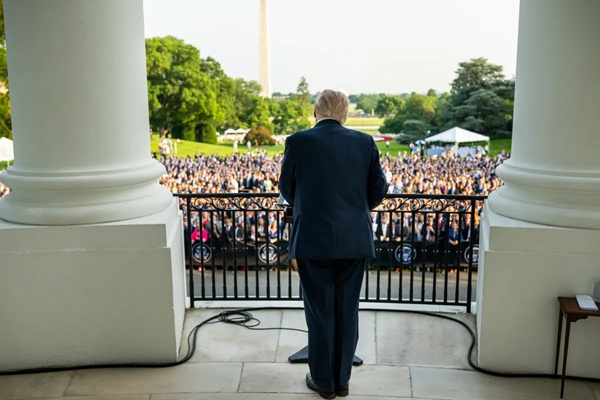.png)
Indonesia’s Lop-Sided US Deal Shows Why New Delhi Must Bargain Hard
As details of the Indonesia–US trade deal emerge, it offers India key lessons, including how Washington can extract its pound of flesh at whim.


Ajay Srivastava, founder of Global Trade Research Initiative, is an ex-Indian Trade Service officer with expertise in WTO and FTA negotiations.
July 23, 2025 at 3:07 PM IST
The details of US and Indonesia trade deal, released on July 22, show that the deal strongly favours the US, opens up Indonesia’s markets, weakens its domestic regulations, and damages its long-standing position at the WTO.
For India, this deal serves as a warning of what to avoid in trade negotiations with US.
Before getting on the detailed lessons for India, let’s have a look into some facets of the Indonesia deal.
Indonesia has agreed to eliminate 99% of its tariffs on US exports, opening its market almost entirely to American industrial, tech, and agricultural goods.
In return, the US will impose a 19% tariff on Indonesian goods, reduced from an earlier proposal of 40%. Additionally, US-Most Favoured Nation tariffs will continue to apply on Indonesian exports, limiting their competitiveness in the US market.
Indonesia has also agreed to buy $22.7 billion worth of US goods. This includes $15 billion in energy products (LPG, crude oil, gasoline), $4.5 billion in agricultural items (soybeans, soybean meal, wheat, cotton), and $3.2 billion in Boeing aircraft.
The US-Indonesia trade deal also forces Jakarta to give up key domestic regulations that have long protected its industries, food safety, and digital space.
Local Industry at Risk: Indonesia has agreed to eliminate local content requirements, which means US companies can now operate in Indonesia without sourcing from local suppliers. This will hurt Indonesian MSMEs that rely on demand from larger firms. Making matters worse, there’s no rule requiring US firms to disclose whether their inputs are sourced from China or other countries.
One-Way Product Standards: Indonesia will now accept US vehicle safety and emissions standards. This allows American automakers to export directly to Indonesia without any local adjustments, while Indonesian vehicles would still have to comply with US rules if they want to export there.
Loss of Health and Safety Control: Indonesia will recognize US FDA approvals for pharmaceuticals and medical devices, committing to TRIPS-Plus rules that go beyond what the WTO requires. This means Indonesia gives up its right to set its own health standards, potentially putting public safety at risk. U.S. exports of cosmetics, medical devices, and other goods will also be exempt from certain Indonesian regulations, allowing these products to bypass domestic safety checks and enter the market with fewer controls.
Threat to Domestic Manufacturing: By agreeing to remove restrictions on remanufactured goods, Indonesia opens the door to a flood of low-cost, second-hand machinery and components from the US. This could severely impact local capital goods and engineering firms that cannot compete with cheaper refurbished imports. The US has been pushing for similar terms with India as well.
Weakening Food Sovereignty: The deal dismantles multiple protections in agriculture. Indonesia will scrap import licensing and commodity balance rules for US farm goods and grant permanent “Fresh Food of Plant Origin” status to all eligible US plant products. This means all type of foods can enter without thorough safety checks.
Worse, Indonesia will now accept US certificates for meat, poultry, and dairy products, ending its own food safety inspections. This weakens Indonesia’s control over what its citizens consume—something the US itself would never agree to if the roles were reversed.
Surrendering Digital and WTO Policy Space: On digital trade, Indonesia has abandoned its earlier WTO stance by agreeing to allow unrestricted cross-border personal data flows to the U.S. and backing a permanent moratorium on customs duties for digital transmissions. Previously, Indonesia opposed these measures due to concerns about digital sovereignty and revenue loss. Now, under US pressure, it has accepted rules that benefit Big Tech at the expense of its own digital policy goals.
Jakarta has also agreed to implement the Joint Initiative on Services Domestic Regulation. It ties Indonesia’s hands in future WTO negotiations, as it can no longer oppose these rules after signing on.
New Delhi, Beware
The US–Indonesia trade deal is a clear example of how aggressive US pressure can force countries to slash tariffs, commit to large purchases, and give up control over their own regulations. India must be careful not to fall into the same trap.
Indonesia gave up far more than it gained, removing 99% of its tariffs on US goods, agreeing to buy $22.7 billion in American products, and weakening important rules that protected its industries, food safety, and digital space.
India now faces similar US demands, including allowing remanufactured goods, opening up agriculture and dairy, accepting genetically modified feed, and adopting US rules on digital trade and product standards.
These are not small changes, they are major shifts that affect India’s long-term ability to manage its economy, protect public health, and support local industries.
For example, agreeing to TRIPS-plus rules would weaken India’s pharmaceutical independence. Accepting US standards on cars, medical devices, or food, without any guarantee of reciprocity, would put India’s consumers at risk.
Handing over control of data under the name of digital trade would give foreign companies power over India’s digital future.
India must stay alert. Any trade agreement should be based on clear, public assessments of costs and benefits. Concessions, especially on critical areas like food, health, digital, and IP, must be fair, reciprocal, and aligned with India’s development needs. Otherwise, India risks giving up long-term control for short-term gains, a decision it may regret later.
History is a Teacher
The US deals with Indonesia, Vietnam, and Japan follow a disturbingly similar pattern of unequal demands. Japan imposed over 700% tariff on rice, imagine the pain in Japan in allowing access to US rice.
The Treaty of Versailles, signed after World War I, imposed crushing and one-sided terms on Germany, and igniting deep national resentment. That imbalance sowed the seeds and ultimately led to the outbreak of World War II.
If Washington continues to favor dominance over fairness, it may secure short-term wins, but at the cost of trust, and disruption of global trade, and genuine economic partnership.



